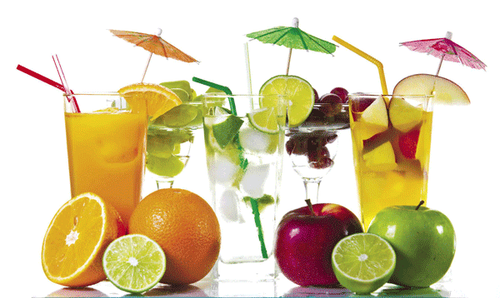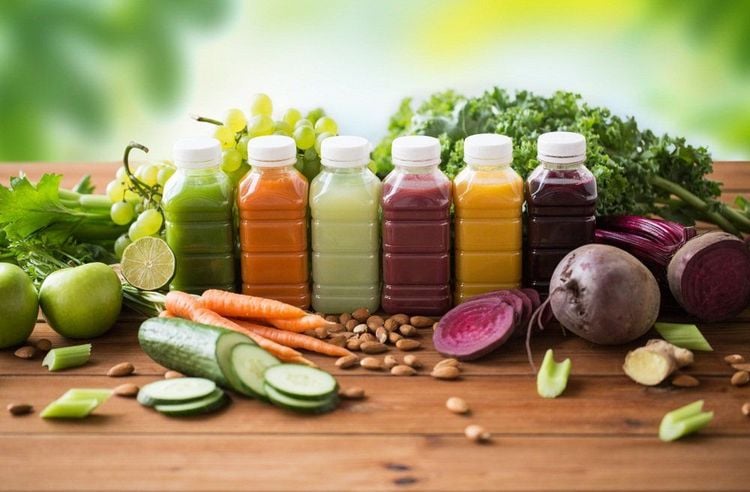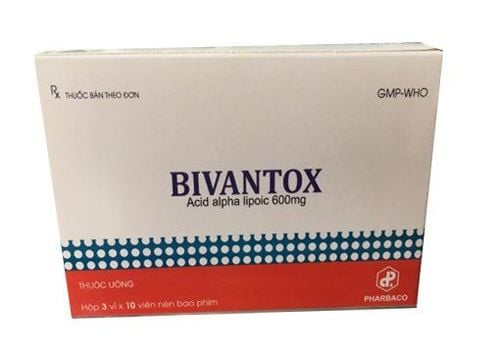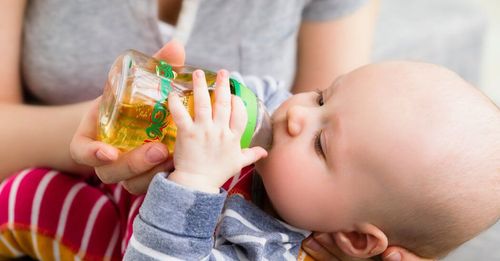This is an automatically translated article.
Fruits are so good for your health, they even help reduce the risk of chronic diseases, such as heart disease and cancer. However, now many people instead of eating fruit directly choose to drink fruit juice because they believe that this method can bring more health benefits. So are fruit juices good or bad?
1. What is fruit juice?
Fruit juicing is a process that helps to extract the juices from fresh fruits and vegetables. The pressing process usually removes most of the solids, including the pulp and seeds of the whole fruit. The liquid obtained after juicing will contain most of the vitamins, minerals and antioxidants found in the whole fruit or vegetable.
There are different methods of juicing, including manual juicing and machine juicing. Currently, two main types of juicers are commonly used, including:
Centrifugal juicers: These types of juicers usually grind fruits and vegetables into pulp through a high-speed rotary motion with only one blade. Cold hydraulic press: Also known as a puree juicer, it slowly crushes and squeezes fruit to obtain as much pure fruit juice as possible. In general, the nutritional quality of fruit juices obtained from centrifugal and cold hydraulic presses is similar.
2. The main purposes of using fruit juice
Fresh fruit juice is often used mainly for the following 2 main purposes:
Purification or detoxification of the body: The elimination of solid foods and only drinking pure fruit juice within 3 days to several weeks is widely believed that it can remove toxins from the body. However, at present, there is not any specific scientific evidence to prove this is completely true. Addition to your daily diet: Fresh fruit juices can be used as a useful addition to your daily diet, helping to increase the nutritional intake of fruits and vegetables without you cannot consume.

Nước ép trái cây giúp thanh lọc cơ thể và bổ sung vào chế độ ăn uống hàng ngày
3. Fruit juice helps to add nutrients to the body
Many of us have difficulty absorbing adequate nutrients from our diets. On the other hand, commercial products now have much lower nutritional content than in the past due to processing methods and times. In addition, polluted environment and excessive stress due to life pressure can also be the main factors that make you deficient in essential nutrients.
Fruits and vegetables are food sources that provide many beneficial vitamins, minerals, plant compounds and antioxidants, which help protect the body against dangerous diseases.
If you find it difficult to include the recommended amount of fruits and vegetables in your daily diet, fruit juices can be a convenient way to boost your intake. friend. Some studies show that consuming fresh fruit juice for 14 weeks can improve your absorption of nutrients like vitamin C, beta carotene, vitamin E, folate and selenium.
4. Does drinking fruit juice help fight disease?
There is a lot of evidence that eating fruits and vegetables directly can reduce the risk of disease, but the research on the consumption of fruit juices with the ability to fight disease is still limited. .
The reason that eating fruits and vegetables directly can bring many health benefits due to their high antioxidant and fiber content. The combination of these nutrients can greatly support the functions of the digestive system.
In general, whether drinking fruit juice is good for health or not is still controversial. In fact, drinking whole fruit juices also offers some promising benefits, such as a reduced risk of heart disease, high blood pressure and high blood cholesterol levels. In addition, consuming fresh fruit juices in liquid form also contributes to lower homocysteine levels and markers of oxidative stress – key factors that increase the risk of cardiovascular diseases. Some studies also show that the risk of Alzheimer's disease is significantly reduced in people who regularly drink fruit juice 3 or more times per week. This is because fruit juice is rich in polyphenols, an antioxidant that protects brain cells.
5. Drinking juice and eating fruit directly: What's better?
Proponents of fruit juice believe that drinking fresh fruit juice regularly is better than eating fruit directly. They think that eliminating fiber during the juicing process will help the body absorb nutrients better. However, there is no scientific evidence to support this view.
In fact, our bodies need the abundant amount of fiber found in most fruits and vegetables. Soluble fiber intake can help reduce your risk of heart disease, type 2 diabetes, and obesity. Moreover, it also effectively improves blood sugar and cholesterol levels. In addition, consuming fiber from fruits will help you feel full longer, thereby reducing cravings.
Notably, up to 90% of the fiber is removed during the juicing process. Specifically, some types of soluble fiber remain, but the amount of insoluble fiber is completely removed. Therefore, in order for the body to receive the full benefits of the fiber in fruit, you should choose to eat the fruit directly instead of drinking the juice.
6. Does drinking fruit juice help you lose weight?
Many people use fruit juices as a weight loss strategy. However, juice only provides about 600-1000 calories per day, leading to severe calorie deficit and rapid weight loss.
Although consuming fresh fruit juices can help you lose weight in the short term, when calorie intake is severely restricted, it slows down your body's metabolism in the long run. . Therefore, drinking fruit juice is not a safe method of healthy weight loss.

Nước trái cây cung cấp khoảng 600 – 1000 lượng calo vào mỗi ngày
7. Should fruit juice replace meals?
Using fruit juices to replace meals is not good for your body. In fact, fruit juice is nutritionally unbalanced because it doesn't contain enough fat and protein. Meanwhile, consuming enough protein during the day is essential for the body to maintain muscle as well as long-term health.
In addition, an adequate intake of healthy fats is also important for your body to maintain energy, balance hormones and cell membranes. Furthermore, they also help provide fat-soluble vitamins, including vitamins A, E, D and K.
As such, replacing meals with fresh fruit juices, while not harmful, can be harmful. can deplete a large amount of nutrients for the development and maintenance of energy of the body. You can make fruit juices more nutritionally balanced by adding good sources of protein and healthy fats, such as avocados, almonds, peanut butter, and Greek yogurt.
8. Detoxing with fruit juice can be harmful to health
Regularly consuming large amounts of fresh fruit juices can increase the risk of metabolic syndrome and obesity. Also, there isn't any scientific evidence that your body needs to be detoxified by eliminating solid foods.
Our body has a natural detoxification system through the liver and kidneys. Furthermore, if you use non-organic fruit juices, you may inadvertently consume other toxins that come with them, such as pesticides.
For people with kidney problems, consuming a lot of oxalate-rich fruit juices can increase the risk of kidney failure. Even more extreme, cleansing the body with fruit juice can lead to side effects such as nausea, diarrhea, fatigue, and dizziness.
Please dial HOTLINE for more information or register for an appointment HERE. Download MyVinmec app to make appointments faster and to manage your bookings easily.
Reference source: healthline.com













